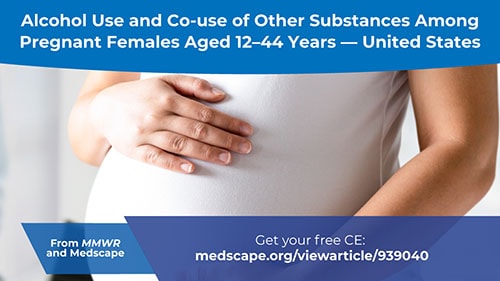Resources to Address Alcohol and Polysubstance Exposure During Pregnancy

Alcohol use during pregnancy can cause miscarriage, stillbirth, and a range of lifelong birth defects and developmental disabilities. These disabilities are known as fetal alcohol spectrum disorders (FASDs). Research suggests that the use of more than one substance, also known as polysubstance use, during pregnancy is common. Increasing practices to prevent substance use during pregnancy can help improve the health of individuals and their children. CDC has resources that can help providers put these practices into place.
Providers: Learn about resources to address alcohol and polysubstance use in pregnancy!
Alcohol use and binge drinking during pregnancy have increased slightly over time. Current drinking (having at least one drink of any alcoholic beverage in the past 30 days) increased from 9.2% in 2011 to 11.3% in 2018. Binge drinking (defined, for women, as having four or more drinks on an occasion during the past 30 days) increased from 2.5% to 4.0% in that same period. In addition, a 2020 report showed that the use of other substances, like tobacco and marijuana, was common among pregnant women who reported alcohol use. Screening for alcohol use combined with brief counseling by healthcare providers is an evidence-based intervention that may decrease alcohol use during pregnancy. However, data show that this service in the general population is underutilized. CDC has resources to assist providers in addressing alcohol and polysubstance use in pregnancy:

- Incorporate clinical decision support tools: These tools help providers do alcohol screening and brief intervention. They can be included in electronic health records to help healthcare providers offer evidence-based interventions to those at risk.
- Improve alcohol screening and follow-up: This online toolkit includes successful quality improvement strategies to help health plans address excessive alcohol use among their members. The resources in this toolkit can also help them improve reporting related to the Healthcare Effectiveness Data and Information Set (HEDIS) measure, Unhealthy Alcohol Use Screening and Follow-up.
- Take free trainings: CDC has five FREE online training courses for healthcare professionals that offer continuing education credit. Topics include
- Diagnosis and referral of children with FASDs;
- Preventing prenatal alcohol exposure; and
- Implementing alcohol screening and brief intervention.
- In addition to the five full-length courses, there are also five supplemental learnings available. These short videos complement the existing full-length courses.
- Earn free continuing education on polysubstance use in pregnancy: CDC partnered with Medscape to offer continuing education for the MMWR article, Alcohol Use and Co-use of Other Substances Among Pregnant Females Aged 12–44 Years — United States, 2015–2018. CDC also led a Public Health Grand Rounds on Reducing Polysubstance Use in Pregnancy. This session featured discussions on polysubstance use during pregnancy and how it might affect individuals and children. The session also highlighted how data can improve our understanding of polysubstance use. It concluded with how screening and brief interventions may reduce prenatal substance exposure and improve the health of women and infants.
More Information
- CDC: Alcohol Screening and Brief Intervention
- CDC: Fetal Alcohol Spectrum Disorders
- CDC: Alcohol and Public Health
- CDC: Substance Use During Pregnancy
- CDC: Polysubstance Use in Pregnancy
- March of Dimes: Beyond Labels – Substance Use Disorder and Pregnancy
- National Organization on Fetal Alcohol Syndrome (NOFAS)
